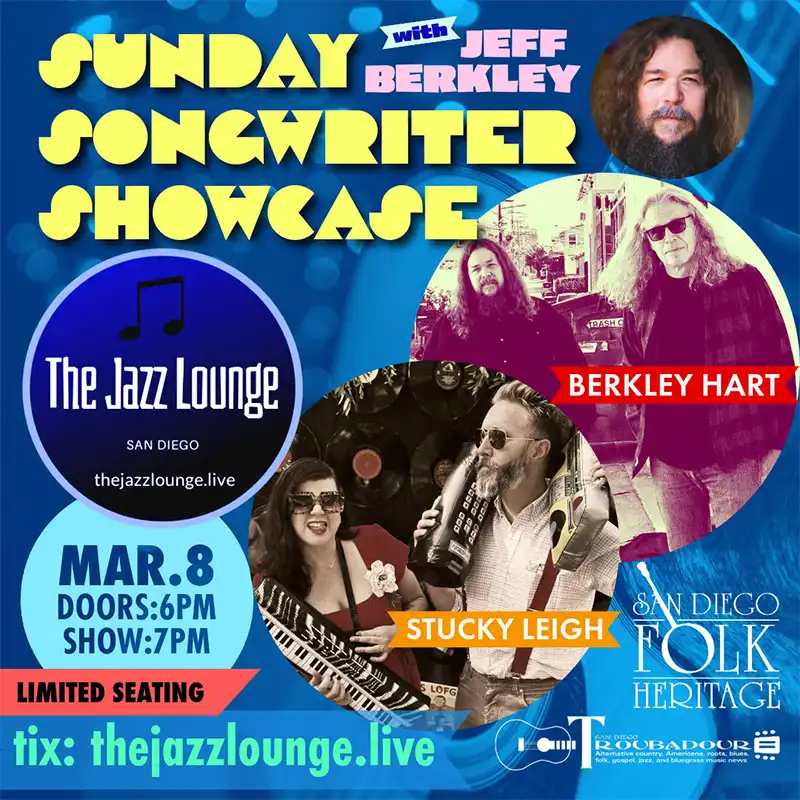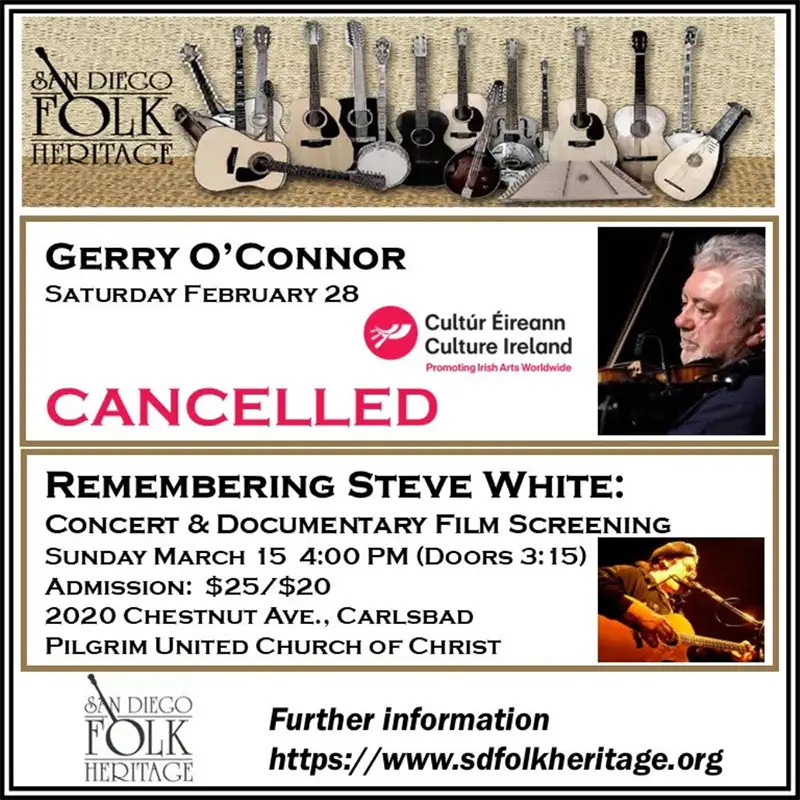Cover Story
Lindsay White: Her Creative Journey of Love, Loss, and Motherhood
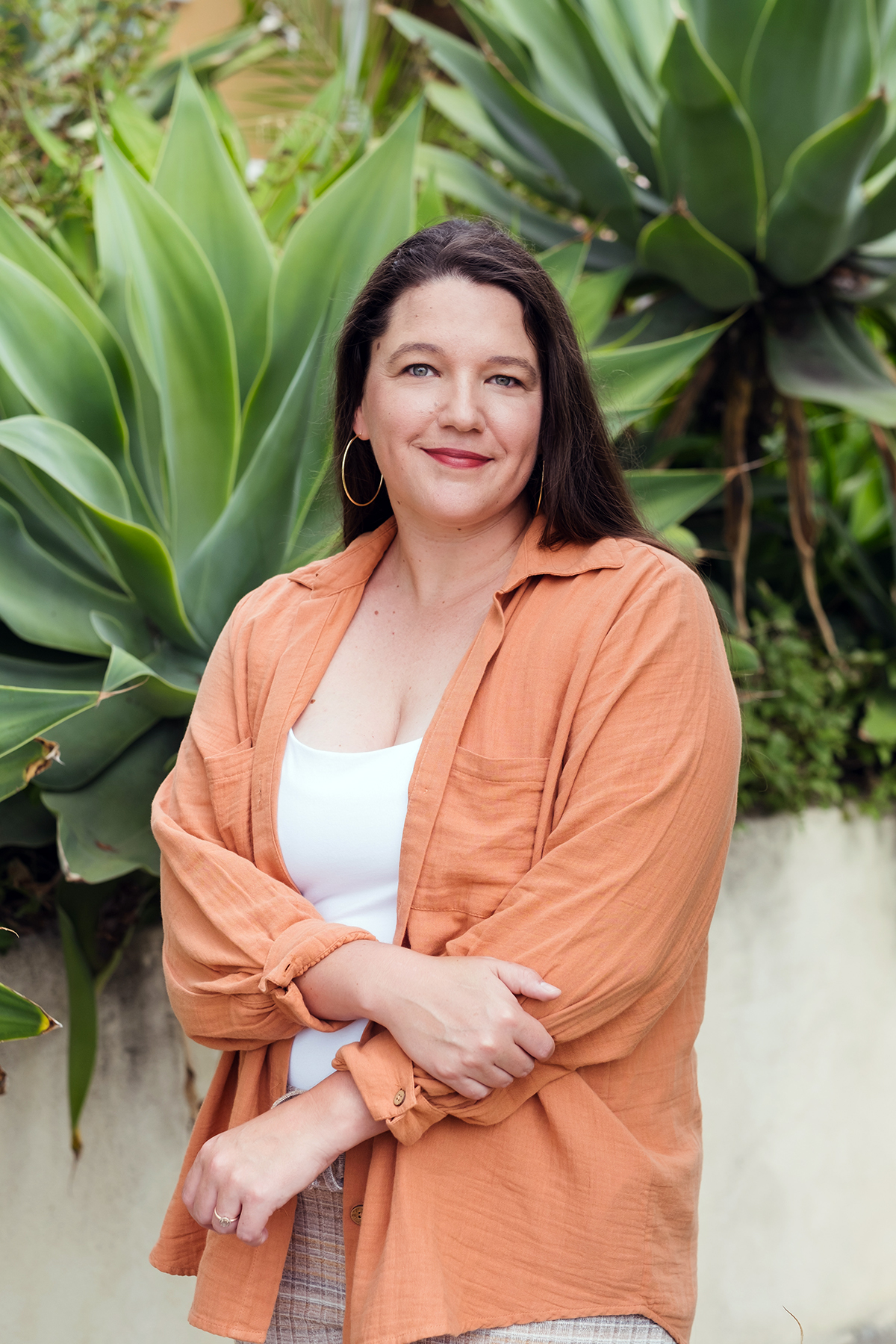
Lindsay White. Photo by Sydney Valiente.
Lindsay White has had a long career in the San Diego music scene. So, I feel honored to write her feature for the San Diego Troubadour. And to be honest, a little intimidated. How do you write something incredible for an incredible writer? Turns out all I had to do is ask the questions and let her talk. I’ve had the privilege of listening to Lindsay live and online over the last couple of years. She’s performed at a few of my Songbirds shows and reaches right into my heart every time. Do you know Lindsay? If you do, you know how incredible she is across the board—a writer, singer, performer, mother, friend, and spiritual guide. If you don’t, you should keep reading and you will. With themes of community, social justice, and grief. The journey is spectacular.
But let’s start in the future. Lindsay’s enthusiasm for her most recent adventure ahead is fascinating. “I get to go spend two weeks at a chateau and just write, which I haven’t done since my daughter was born.” What she’s referring to is an artist residency in France this coming November. To be alone and present in the moment is equally exciting and scary, which left questions for Lindsay. “Am I still a creative artist? Do I still believe in what I do? Is it even worth my time to take two weeks away from my daughter and work on this project?” She’ll be working on finishing a book she started with the working title, “Dead Mom Talking.” I was surprised to find out she wasn’t talking about herself. Instead, it’s about an intense mediumship experience she had with her late mom right before she became pregnant. “I’ve always considered myself a spiritual person…I never really knew how to describe it.” Lindsay had been estranged from her mom for years, but they reconnected after her mom was diagnosed with terminal brain cancer. Sadly, their relationship remained strained until her mom’s death two years later. Lindsay found herself continuing to work on their relationship through mediumship. “It was a trippy, slightly traumatic, beautiful experience that I really wanted to capture through writing because that’s how I process all of my life events. I started writing this book about it, got pregnant, and haven’t really touched it since she came into the world.” This trip is an exciting uninterrupted time to sit with it again. “And because I’m extra, see if I can get an album out of it.” An audio experience alongside a deep spiritually healing book sounds like a creative dream. Authors note: I can’t wait to read this…and hopefully hear it, too. It’s an interesting time for Lindsay and I to be talking and relating through grief. This is one of the most important processes of making art. “I’m excited to see what I can get done in those two weeks. This is my first time traveling solo abroad. When you’re a mom, you give up so much of yourself in order to be a good parent. I’m excited to reclaim my creative identity.”
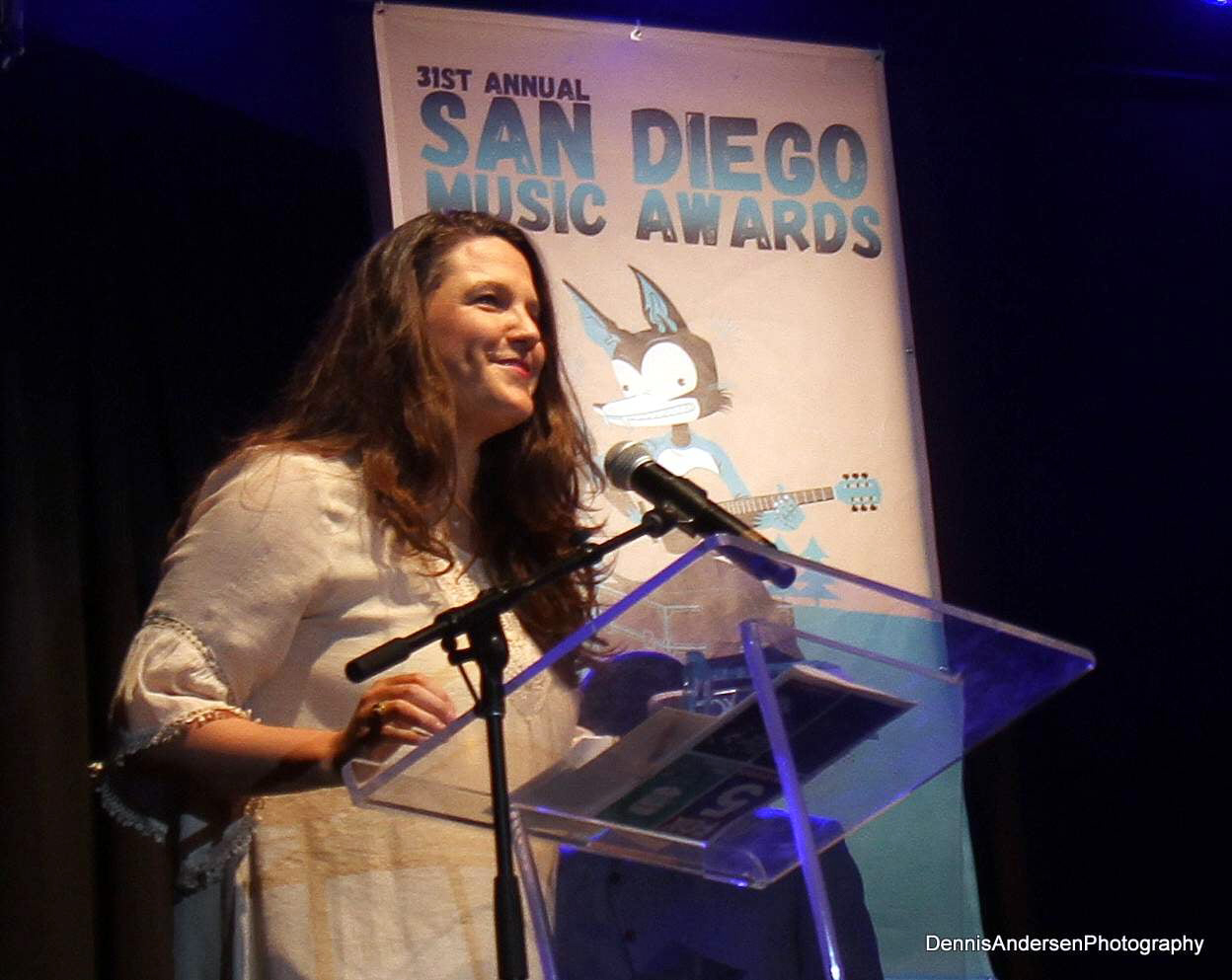
Award winner Lindsay White at the San Diego Music Awards. Photo by Dennis Andersen.
“Will you work on music while you’re there as well?” I pipe in. “I’ll probably just stick to the book writing; the hardest thing is to get into that headspace to write anything substantial. The recording I can carve out time for in different studios. I’ll probably work on the recording in 2025, at least I hope so.” She mentions that processing is how she approaches songwriting, too, and hopes it helps heal some of the traumatic things she’s been through. “I haven’t been able to process it thoroughly. Hopefully this will allow me to do that and get unstuck mentally and emotionally.” And if people happen to be interested, that’s just the icing on the cake. “I’m doing this for me—if you find it resonates for you that’s great, too.”
Any specific stories or teasers from the book? “The biggest lesson I’ve learned is that you can continue to work on relationships with people who have passed and continue to heal. The reason my relationship was estranged is because I came out, and my mom [who was Christian] couldn’t accept me. Through these mediumship experiences, what I get from it, those ideological differences are so human and once you are free from the prisons that you create, things can move forward. So, I don’t get a sense from my mom’s spirit that she’s still a religious bigot. Now, she is very aware that it’s all human bullshit fed to her by something that didn’t allow her to see me for who I was and love me for who I was. Now, I get the sense that she does.” She hopes to convey this in writing and help those parents who are grappling with religious or political values or whatever instilled into them. And love our kids while they’re here.
This perspective aligns with Lindsay’s passion for community and social justice, contrasting sharply with the spiritual bypassing that leaves many spiritual healers favoring “positive vibes” over engaging in social justice work. Conversely, Lindsay believes it’s her spiritual duty to fight for a liberated world and regularly encourages people to join this fight by developing their own practices of community care. “Everything I’ve learned about spirituality and what happens after we die points to the fact that we are all just small pieces of one big whole, which is one big love. We’re all here to practice that.” Spirituality tied into the idea of liberation, as opposed to those who are here to protect their own, is the goal.
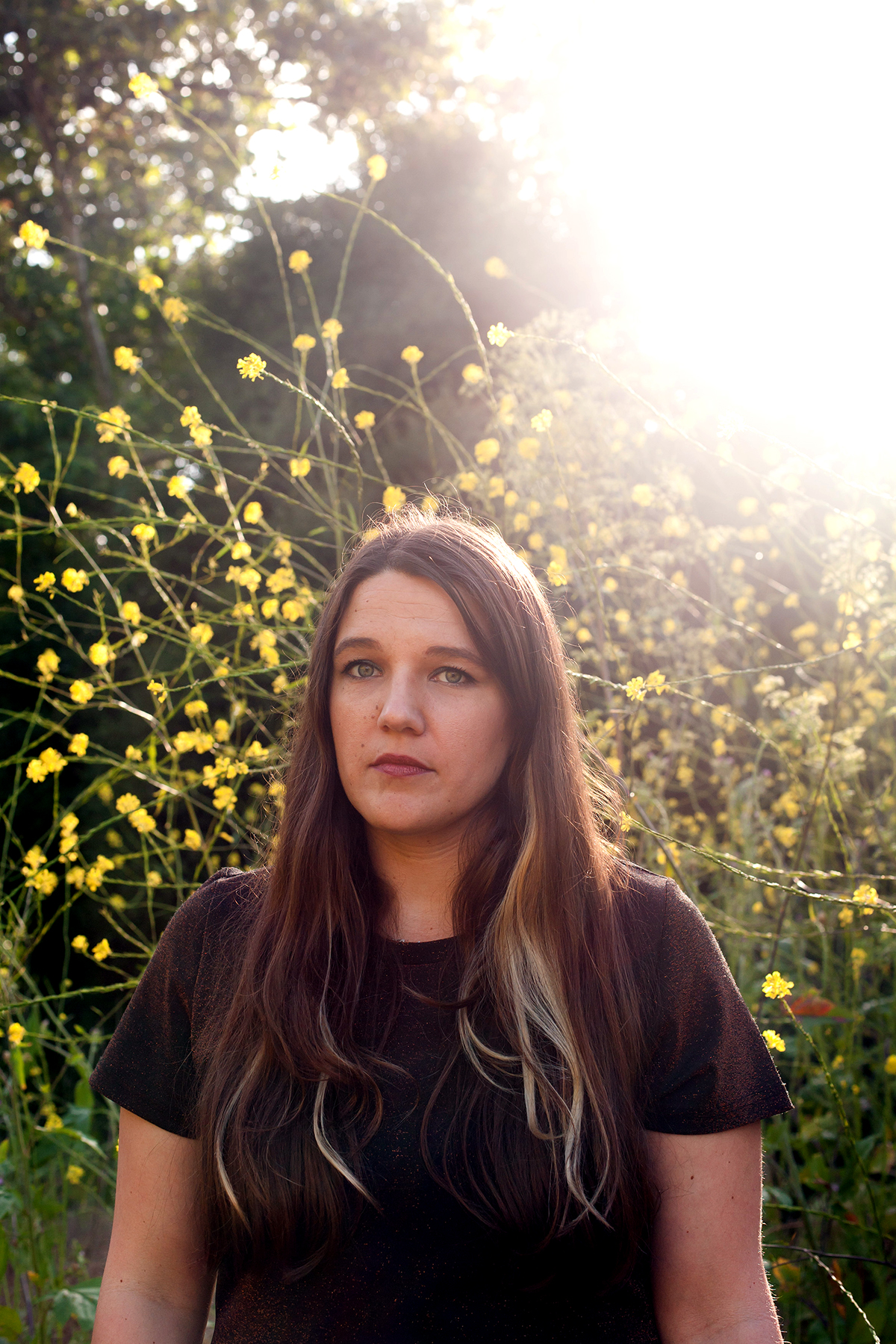
Photo by Darci Fontenot.
I have so many more questions for Lindsay about this experience. I could wait for the book, but here I am on the edge of my seat. “So, you talk about mediumship, does that mean you were your own medium or did you work with others through it?” “I was my own medium,” she says. “So, this was all during the pandemic. I’ve had mental health issues my whole life. Mostly anxiety and a little bit of depression. I got to a place where I was just not well during the pandemic.” On a rollercoaster of being hopeful and disappointed, meanwhile, COVID was happening all around us. “So, I started really committing to meditating to try to get my own headspace a little more stable. And what happened in that process is I tuned into that frequency that is available to all of us.” With a channel wide open, she talks about feeling her mother in several ways. In a physical way, she was able to move her body in a way that she would answer. As in she could ask her a question and she could say yes or no. This moved into being able to channel the loss of other loved ones. It transitioned to a more intuitive level, sensing energy and thoughts that weren’t her own. “Music comes into play sometimes. But, actually, conversing with someone I’ve been able to converse through physical motion, through scribbling for lack of a better word.” She mentions Tyler Henry who can do that as well. “Sometimes typing. I know it sounds kooky. I feel like I conjured the experience because I was so deep in meditation…I asked, and I received. Some of it was very scary and very traumatic because I didn’t understand at the time what was happening. There was a scary moment where I channeled my friend’s son and didn’t understand what was happening. It scared the shit out of me and my wife. My sister had to fly down because it was physically affecting me.” She relates it to those movies you watch where people are possessed. “That’s kind of what it felt like.” So, there are beautiful moments as well as traumatic moments, but the fear ran wild. Now that years have passed, “I’m more in control of the dial, so to speak. I’m not afraid anymore.” She credits pregnancy and parenthood for keeping her grounded. “I’m very familiar with what mania looks like. It’s unsustainable to live wide open to the universe all the time.” But then she finally did get pregnant. And then just got unstuck. “Okay, bitch, it’s time to be responsible and it tethered me in a way I needed to be tethered. I was able to create some safety around it. It’s hard to talk about…it’s hard to find the words.”
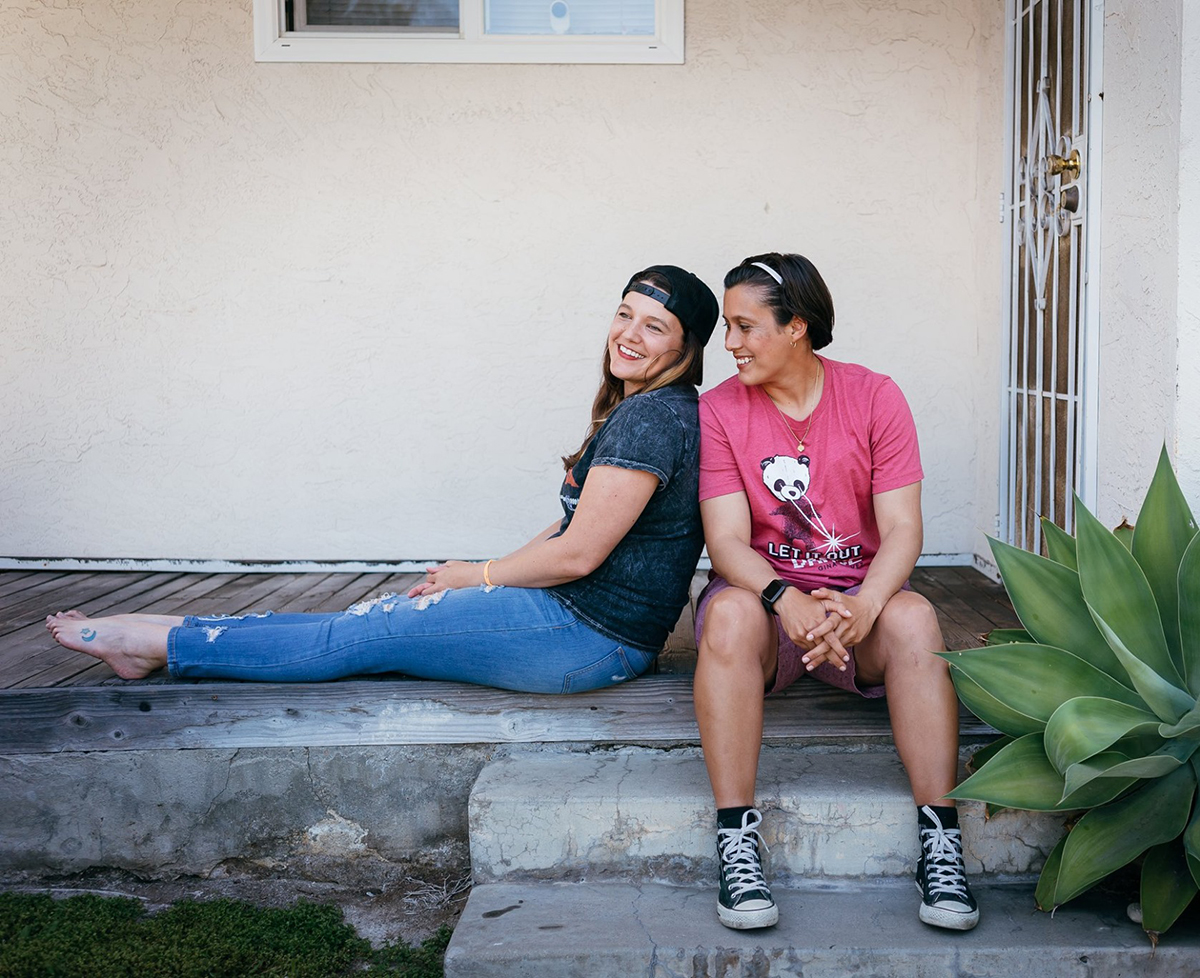
Lindsay and her wife, Audrie. Photo by Sydney Valiente.
Back to my comment about relating to Lindsay…as someone who recently lost a parent, I find this incredibly inspiring. Lindsay believes that you can help people through mediumship. I couldn’t agree more. And now recently, with the loss of her ex-husband, she is feeling the knock. “It does draw me toward it, but I also don’t want to be unethical about it…I have to be mindful.” Lindsay is fascinating. She then tells me a story about “practicing” mediumship: she connected to a friend of her sister’s, who had passed, and relayed back a vision of giant wings. Turns out the friend was a costume designer who had made her a beautiful set of wings that hung above her bed in college. “That validated me running around basically talking to myself,” she laughs. “I’ll sort all this out in France,” [more laughter]. As mentioned, I can’t wait to read this book. But moving on, I am eager to learn more about Lindsay. So, let’s get to some basics.“Where are you from?” I ask, very basic. “I am from Corcoran, California.” She calls it the stinky armpit of California, which is just a small farm and prison town between Fresno and Bakersfield. From there, she just kept making her way south. Attending college in L.A. and playing basketball there, which was her main thing, she then got a coaching job in San Diego. “That is what I thought I was gonna do with my life but I was like, nah. So, music came to the forefront.” Then, like so many of us, I meet Cathryn Beeks, the great networker. “The connector of all humans,” I pipe in. A lot of our San Diego stories begin with Cathryn Beeks. We’ll get back to that.
Who are your musical inspirations? Second basic question. “I always go with Bob Dylan number one.” She was turned onto his music because her dad was a big fan. Tracy Chapman, Carole King, John Prine, and “I always list Shell Silverstein even though he’s a children’s poet—highly, highly influential on the way I learned to write. Then as I got older, I started getting more of the ’90s/2000s: Jewel and Ani DiFranco and a lot more feminist-focused artists seeped in. It was a melding of those styles as far as inspiration goes.” But she listens to everything, anything that is good anyway, mostly in the songwriting.
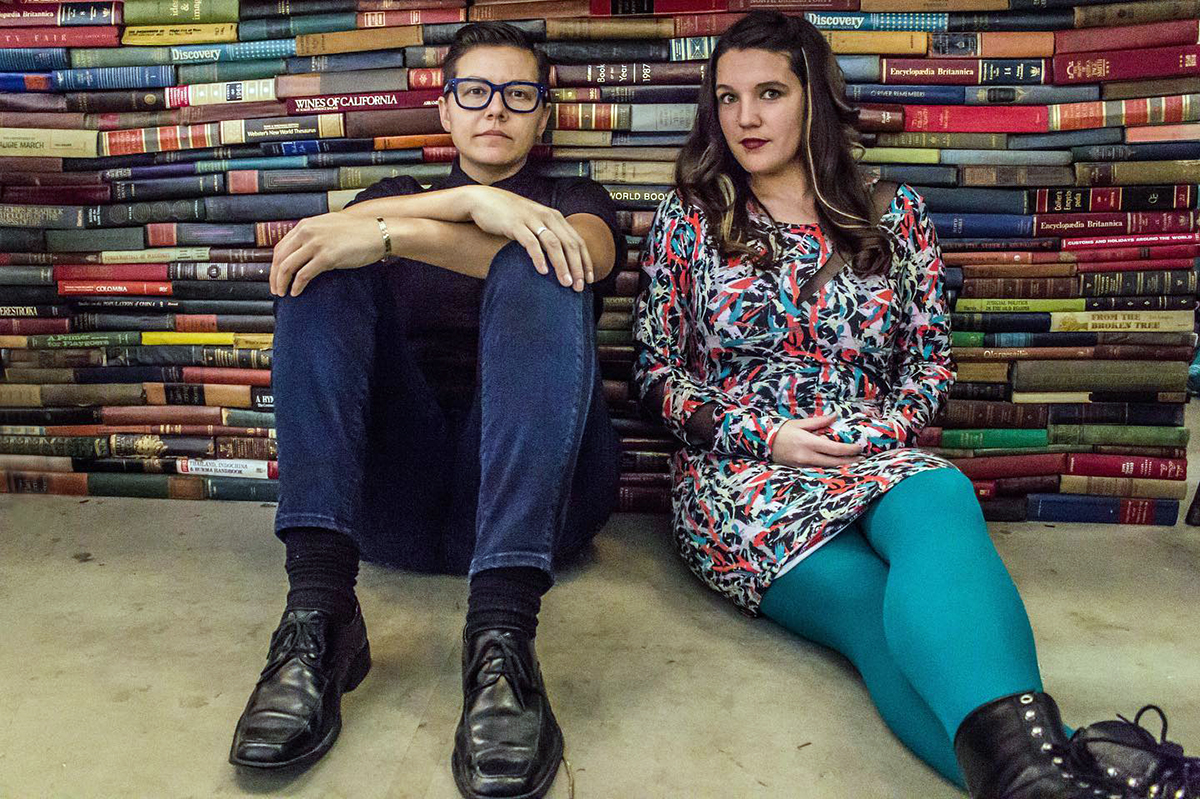
The Lovebirds: Veronica May and Lindsay White. Photo by Alfonso De Alba.
What made you start songwriting? “I used to write poems and stories. My dad was an English teacher so reading was a big part of our house. And being allowed to be creative and tapping into imagination.” In Middle School, her dad had a guitar in the house, and she started teaching herself to play when home sick from school. “I started including music to what I was already writing.” She liked having a vehicle for the words.
Back to Shel Silverstein, “It’s so funny because he’s a silly children’s author but there’s so much about his style that I see in my own music. You know that sucker punch of a last line…or big themes that use humor to deliver them. Expressing universal themes with a strong hook like a knife twist, I love that kind of writing.”
How many albums have you released? “I have three albums with the Lovebirds, which was my duo with Veronica [May]. Sandwiched between my two solo albums were a bunch of singles.” Her last full album was 2017. “My goal to keep my toe dipped in the water of recording is at least a song a year, that’s what I’ve been trying to do since the pandemic. I think I’ve stuck to that for the most part.” She starts counting singles in her head and we laugh at her own surprise. “…I’ve done 13 singles since my last record!” I chime in with, “well, that’s an album.” She replies, “What is an album anymore anyway.” I have no idea. We discuss how you do it for you and archival purposes, “because the rest of my songs will die in the elephant graveyard of YouTube.” The recorded ones are always an accomplishment.
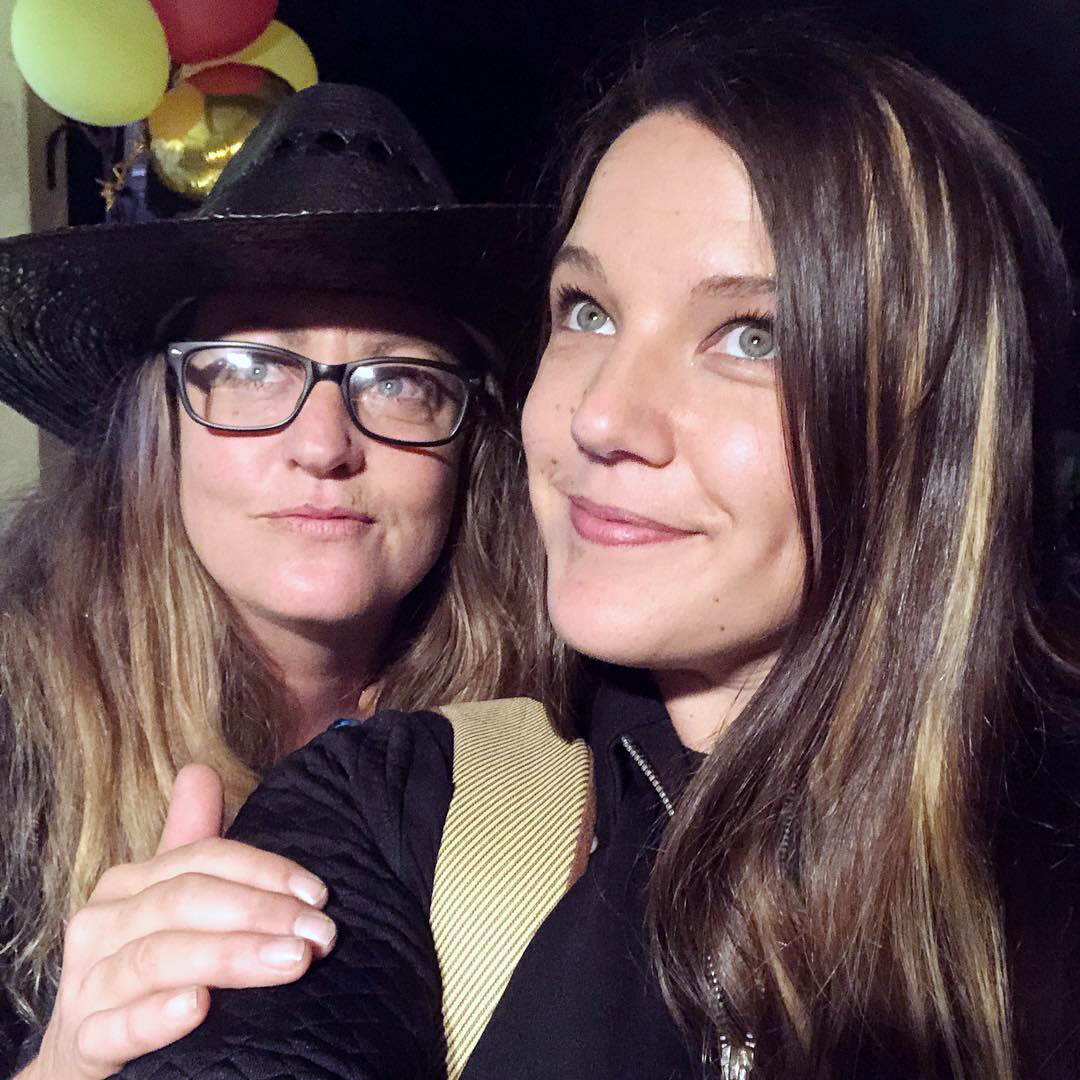
Cathryn Beeks and Lindsay White.
Last year, Cathryn Beeks threw Lindsay the most epic 40th birthday party. She invited San Diego artists all over to come perform Lindsay White songs at a beautiful Ramona wedding venue called Lavender & Olive. “How did it feel to have all those people performing your songs?” “Really surreal,” she laughs again. “You gotta be careful what you say around Cathryn. You throw out an idea or wish list…I threw out the idea on Facebook that I wanted people more talented than me to perform my music and she was like ‘done.’” It was a beautiful concert, full of some of the people she admires most. “It takes a lot of care and that was the thing that struck me most. People that have busy lives, taking the time to do something like that. So, I’m like, if you ever need a kidney, let me know!” Me again, “I’m gonna print that in case she really needs a kidney one day.” “Please do.” Not that I want to leave anyone out, but I was curious if one or two performances really stuck out to her. “How do you pick your favorite child? Well, what’s cool is when you get to see other people do your songs, you get to see them reimagined. For example, someone like Sandi King singing one of my songs called ‘Cat Got Your Tongue’… to listen to someone with a voice like hers singing words I wrote…this is so impressive. I could never sing my songs like that. I threw my shoe at her, because I was overwhelmed in the moment. And Mark Montijo sang a song called ‘Don’t Want.’ He Mark Motinjoed it and made it sound like a song he wrote. To hear someone with that performance ability turn my song into something of his was really cool to watch.” I pipe in with, “I hope one day someone throws a shoe at me.” “If someone could put a chunk of cash in a shoe and then throw it at me maybe,” she replies. We laugh.
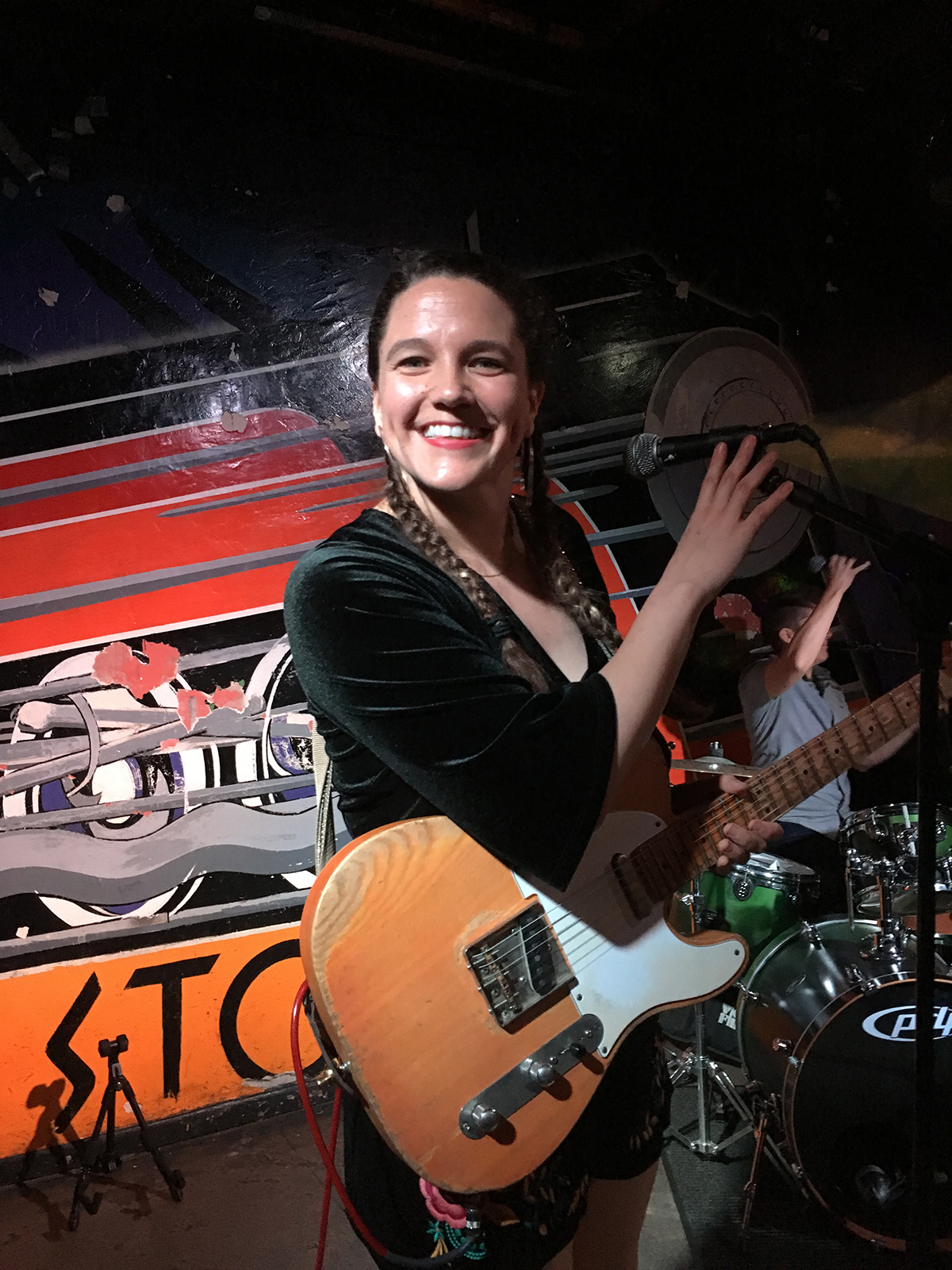
Photo by Liz Abbott.
What are some of your greatest accomplishments in both music and life? “I’ll mention a musical accomplishment. When the Lovebirds were one of the winners for the Kerrville Folk Festival’s New Folk Contest…any judge on any day can come up with a group of winners. But the experience of attending that festival and being surrounded by people who take songwriting so seriously as not only a passion but also a career was just about as validated as I’ve ever felt as a songwriter. Then to be selected as a winner opened up even more experiences.” Experiences like a whole house concert tour, performing on the mainstage the following year, sharing a bill with and meeting David Crosby. “That was the moment in my career when I felt I had the most momentum as far as the business of music is concerned. As that duo, I felt like we were gaining traction in the national folk circuit, which is always what I’ve wanted to do, so that was really beautiful to be recognized for songs I’ve written and really validating as far as my identity as a songwriter and not feeling like it was some sort of hobby…it was the first time in my life I’ve felt really respected…. There was a reverence for what we did as art, and we don’t get enough of that in this field. That gave me a lot to go on for a while.”
I wanted to talk to Lindsay more about being a Mom in music, as I know that’s a huge part of her journey. So, I asked her some non-question questions and just let her fly. “If you are committed to doing a good job as a mother, a lot of your identity gets shelved a little bit, just by nature of how many resources you have. Do you have a village? In our case, Audrie’s family doesn’t accept us. So, they’re out of the picture. And my family lives too far away… we’re working class people, so we don’t have a lot of cushion that you need. The first couple of years was really 24/7 being with River and making sure she had everything she needed. When you dive into someone else’s needs to that degree, your needs tend to go out the window, and that’s just the way it is, something you signed up for. It shouldn’t have to be like that but this country hates women and mothers. So, it’s kind of an uphill battle; if you’re not radicalized, it makes you even more radicalized. But it’s my greatest masterpiece. Every time I think about how much I’ve had to give up creatively to be a mom, I think about how this is my biggest honor and the most creative thing I could possibly put into the world. It’s in many ways my biggest legacy that I will leave. More so than a few silly singles on Spotify…I’m responsible for her childhood and how safe she is, growing up in a world that’s really not set up for people’s success. So, putting everything I have into her is everything. Sometimes it does feel like a huge sacrifice…but now that she’s getting a little older, there’s more room to move about the cabin so to speak. You start to get your bearings back…. you just roll with it.
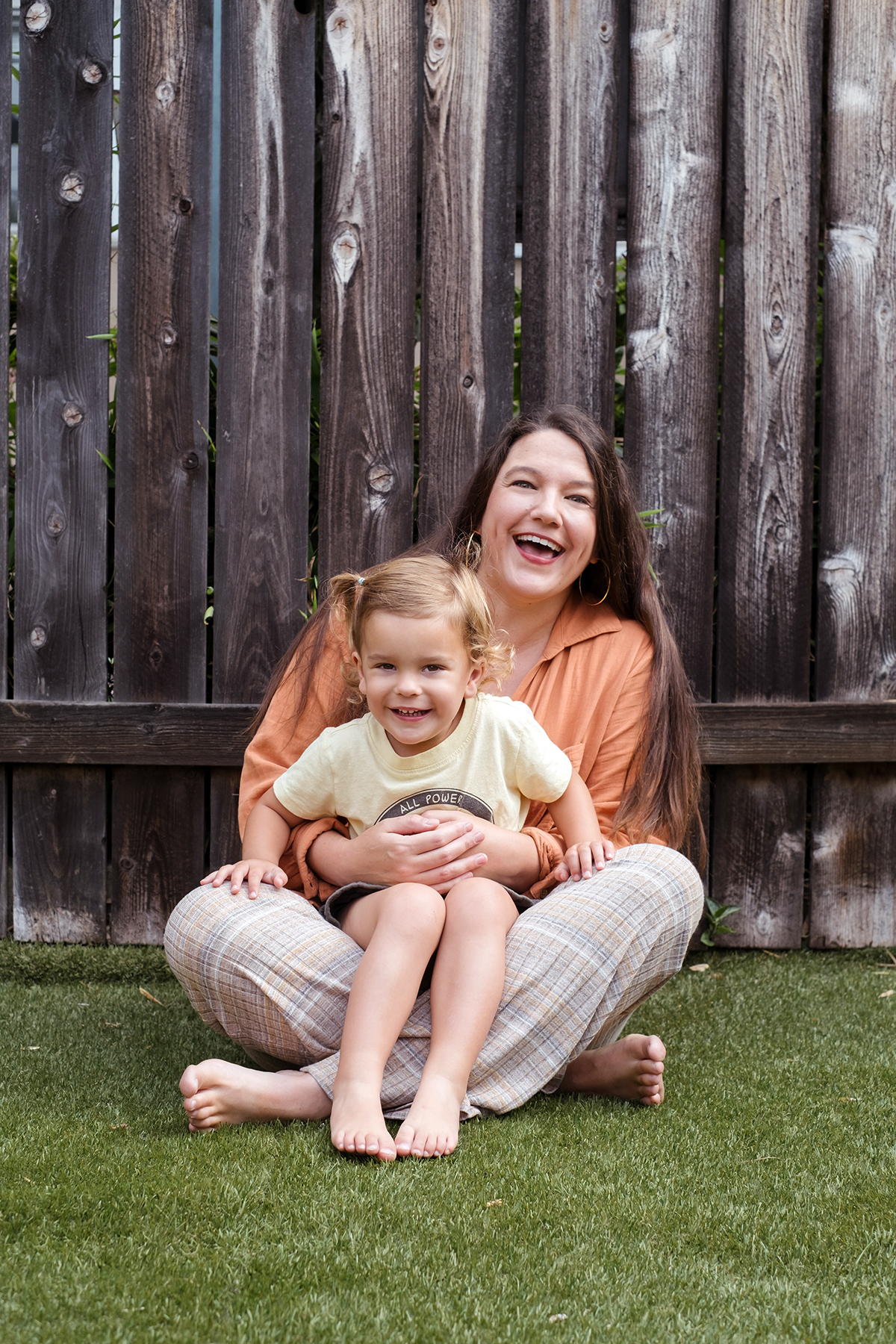
Lindsay and daughter, River. Photo by Sydney Valiente.
Beautifully said, Lindsay. Since we’re on a deep and emotional roll, I wanted to touch on more on grief, specifically in music. It was something she mentioned early on. “Grief has been a throughline for me creatively…that all comes out in my work. But the grief of losing people you love, which I’ve had my share of, but there’s also the grief around losing relationships due to what I call ideological prisons. Coming to terms with my sexuality, I lost my mother when she was alive and then again to death. And I lost my ex-husband through that process, too, because I was married to him and came out afterward; I lost that relationship and then lost him again. I see these patterns happening in my life where grief is in many ways sort of like this huge roadblock that gets set up and impedes me from building momentum in areas of my life that I’d like to see flourish. It always knocks you down a peg to have to grapple with these huge emotional losses. But the only way I know how to grapple with them is to write about them, process them, let them teach me the bigger picture lessons. And then alchemize it into some sort of art that will not only make my heart feel better but also allow other people who maybe don’t have that skill set to read or listen to what I perform or write and have their own experience; that is the secondary goal. I’m doing this as a survival skill for myself; writing is my healthiest coping strategy. And then the cherry on top is having other people feel the same way and say I couldn’t put it into words. It’s such a rewarding and fulfilling experience when you’re able to have that impact on people who have gone through similar challenges in their life. Grief has been the red light and the green light. I fucking hate it. But I have to address it, or I won’t be able to go on. I don’t know if this is true, but I think I might have a reputation as being the sad girl when it comes to my music. It’s not like I’m waking up and choosing to write about sad shit… these are the cards I’ve been dealt with in my life and I’m writing my way out of this pile of manure. How can this manure turn into a garden? Tying that back into motherhood….do you know I do journals?”
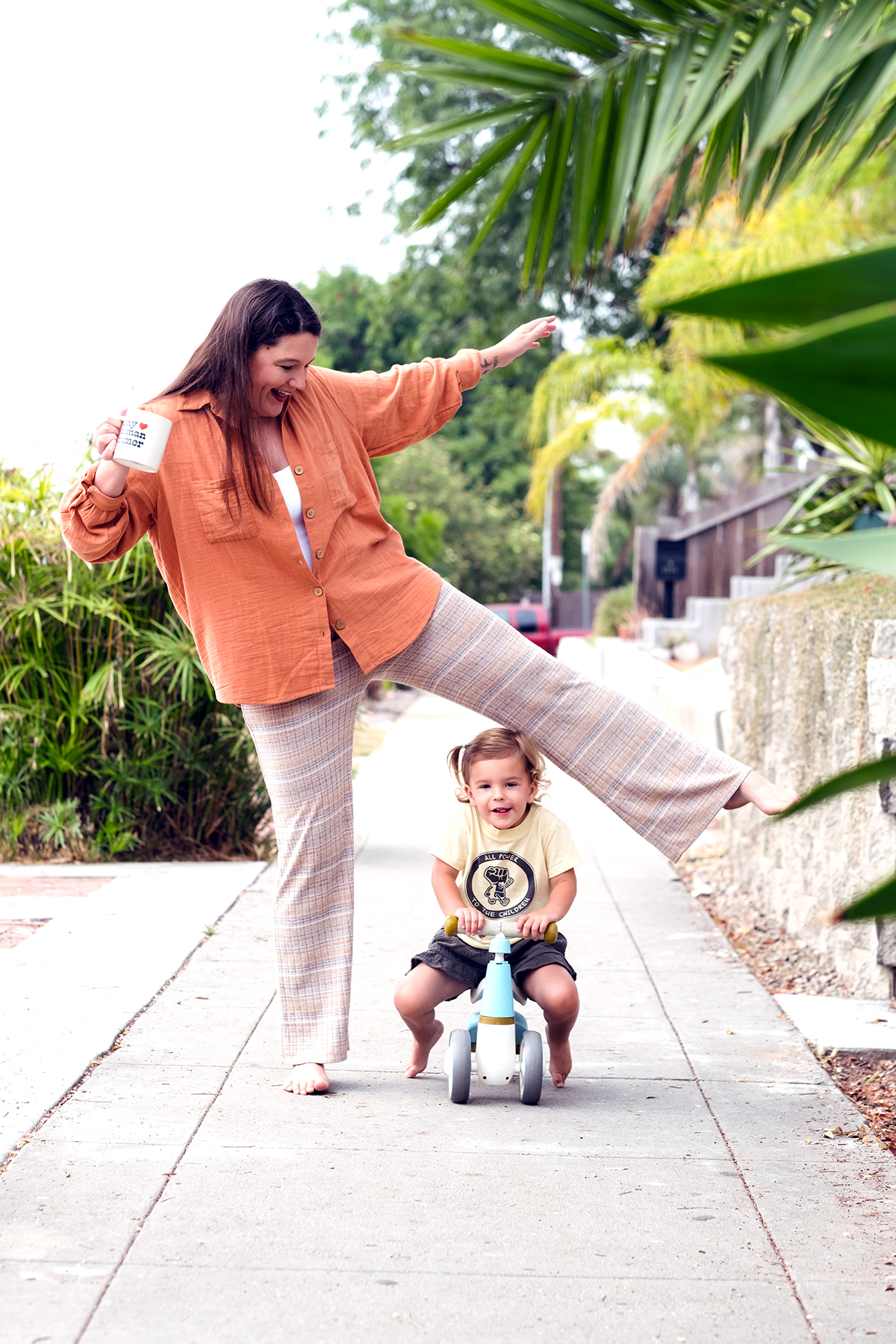
Photo by Sydney Valiente.
Tell me about the journals. “When I had River, I was not able to do music, but I had always wanted to do a line of journals; I was literally working on prompts for my journal line while breastfeeding in the middle of the night, and that was a way to stay creative in the throes of postpartum. I like it as an extension of this grief work. It’s one of the things I hear regularly after shows, I could never say it that way…and I’m like oh but you can…anybody can write about this stuff. I am happy to offer that as an option because I think people sell themselves short when it comes to their ability to express themselves.”
Do you prefer performing live or in the studio? “Performing live, not that I consider myself this amazing performer or anything, but there’s a malleability about the set, the banter between songs, that can really take its own shape, and then it’s done. And then you wash it away and if you fucked up it’s not a big deal, if you had a great time, it was a great moment. There’s not this finality about it in the sense that production and being in the studio brings…there’s a stress of getting it right. If I’m able to perform in a listening room setting, I enjoy creating a story out of the set.”
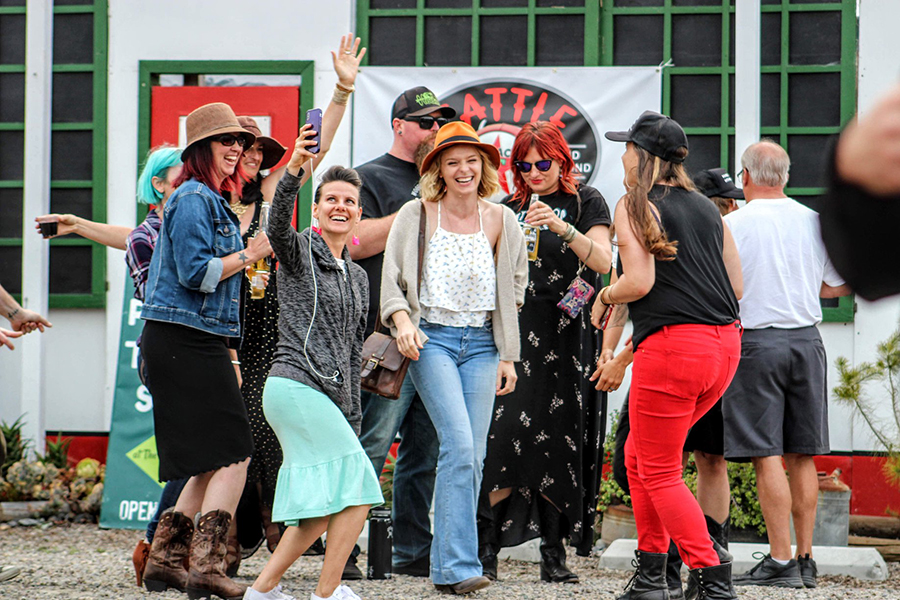
Scene from the Lady Brain Festival. Photo by Jamie Newsome.
What is one of your favorite show moments? “Lady Brain Fest was pretty cool, co-producing that with Cathryn. She’s amazing. I never would have been able to pull something like that off without her. She kinda took the reins and went with it. The day itself was stressful, but to see it come to fruition…people seemed to enjoy themselves and the music was really great. To be part of that just made me feel like I was part of a community in a way that really brings me joy. I think in the beginning that that level of stress was so high, you want to get your performance over with so you can continue to go back to the manager role, but as the day started to progress and I could see that everyone was happy, I started to relax and be present in the moment, which is hard for me to do. The day ended with Tori Roze crushing it as always and everybody was dancing and having a good time and I was looking around like “damn, we did this” and that was such a great moment.”

The Lady Brain Collective. Photo by Sharisse Coulter.
What is Lady Brain? “It was a community of local gender-marginalized creatives coming together for resource sharing, workshops, planning gigs, and festivals; we had a podcast, we had a website, we did member-written reviews for each other. It was just a self-contained hive mind of people who wanted to see each other thrive and use art to build up their communities. It was amazing and then came the pandemic and smooshed it.” Side note from the author: I thought Lindsay said “swooshed it” during the interview and made it a very funny basketball joke. Thankfully I listened back. Lindsay laughed…she’s so nice. “It was very much an in-person operation. At that time I didn’t have the knowledge that I have now about making it accessible online…I think if I had those skills I might have been able to have virtual offerings. But it was so fresh in the pandemic and just an unrealistic expectation to think that members had the capacity to participate when they were just trying to survive the financial toll it took. That coupled with my own challenges with fertility, it became too much. When something like that becomes more stressful than rewarding, I’ve learned over time that it’s okay to take a step back and reassess. Never say never—I could still get something like that going again but it has to make sense.”
Is there a favorite show that you’ve attended? “Cathryn Beek’s band was playing at the Belly Up. I think it was one of my first shows there and to see her play, I felt like I was watching a celebrity…and to now becoming friends with all these people on that stage, I was such a young girl starting out in the music scene and it’s just a cool moment to look back on because now she’s such a dear friend. It shows you what’s possible as a musician. You can have these big on-stage moments, but at the end of the day, it’s about the relationships you build.”
What is your desert island album? “Blood on the Tracks by Bob Dylan.”
What’s one of your favorite songs you’ve ever written? “Probably ‘Lights Out.’ It’s about my mom, the first song I wrote after she died.”
Lindsay White is an open book. I hope you’re as inspired as I am. I suddenly want to meditate, channel loved ones passed, write my heart out in a book and songs, kiss everyone I love and accept people for the beautiful souls they are. I have immensely enjoyed getting to know her, but I feel like there’s so much more beyond this interview. I bet we can find it in her music. Let’s all go take a listen.
Follow Lindsay for ways to stay connected and support:





